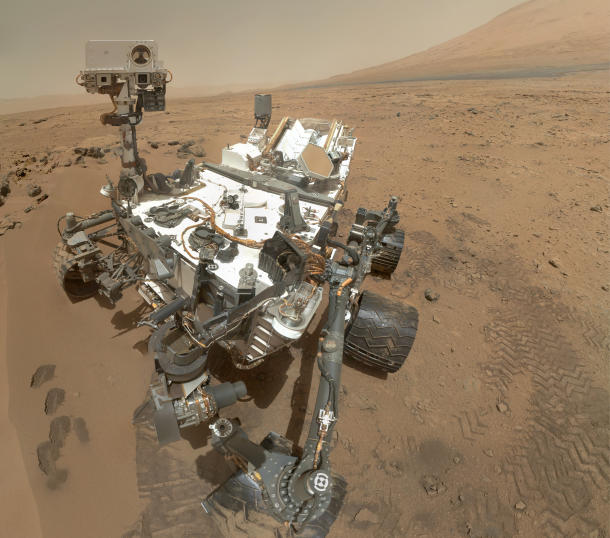The absence of methane on Mars greatly reduced the chances of finding life
Dreamers to find life on Mars received another blow as a result of recent studies of the Curiosity rover.

Self Curiosity.
From the moment the curious rover touched the sandy surface of a distant planet, researchers on Earth hoped to stumble upon signs of alien life. We would be excited even if a single microbe was found, but from the very beginning of the research, the hope for this resembled a wishful thinking rather than a real scientific opportunity.
Methane is an indicator of the vital activity of microbes on other planets, just as it happens on Earth. An article titled "Low Methane Content on Mars", published in the journal Science, reveals the results obtained with Curiosity. The article states that methane on the surface was not detected at all.
Curiosity searched for methane using a laser spectrometer, a device that studies the rock for spectral characteristics of methane. Analysis of the results shows a zero methane content, but with a correction for the fact that the device still works with a certain measurement error.
The article sums up that these results - "... reduce the possibility of the existence of methanogenic activity of microorganisms on Mars".
This failure to look for a foreign life is somewhat confusing after reports in 2003. They reported that clusters of methane were found on Mars. This casts doubt on the results of previous studies, leaving scientists with a tangled tangle of new questions to be answered. Has methane been detected before? If so, where did he go now?
Although the study has reduced the hope of finding life on Mars, scientists still do not rule out the possibility of this being a success. Scientist John Grotzinger, who is directly involved in the mission of the rover Curiosity told The New York Times only that the results reduce the chances of finding life.
')
Curiosity's mission continues. Rover is constantly in the process of searching, but people who are looking for signs of life on the red planet may need to prepare for disappointment.

Self Curiosity.
From the moment the curious rover touched the sandy surface of a distant planet, researchers on Earth hoped to stumble upon signs of alien life. We would be excited even if a single microbe was found, but from the very beginning of the research, the hope for this resembled a wishful thinking rather than a real scientific opportunity.
Methane is an indicator of the vital activity of microbes on other planets, just as it happens on Earth. An article titled "Low Methane Content on Mars", published in the journal Science, reveals the results obtained with Curiosity. The article states that methane on the surface was not detected at all.
Curiosity searched for methane using a laser spectrometer, a device that studies the rock for spectral characteristics of methane. Analysis of the results shows a zero methane content, but with a correction for the fact that the device still works with a certain measurement error.
The article sums up that these results - "... reduce the possibility of the existence of methanogenic activity of microorganisms on Mars".
This failure to look for a foreign life is somewhat confusing after reports in 2003. They reported that clusters of methane were found on Mars. This casts doubt on the results of previous studies, leaving scientists with a tangled tangle of new questions to be answered. Has methane been detected before? If so, where did he go now?
Although the study has reduced the hope of finding life on Mars, scientists still do not rule out the possibility of this being a success. Scientist John Grotzinger, who is directly involved in the mission of the rover Curiosity told The New York Times only that the results reduce the chances of finding life.
')
Curiosity's mission continues. Rover is constantly in the process of searching, but people who are looking for signs of life on the red planet may need to prepare for disappointment.
Source: https://habr.com/ru/post/194464/
All Articles